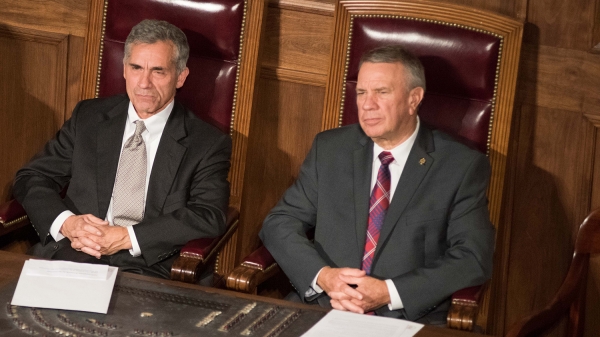|
Getting your Trinity Audio player ready...
|
Children’s health care is once again under threat. A new report by First Focus on Children, a bipartisan advocacy organization dedicated to prioritizing children and families in federal policy, warns that Congress’s recently adopted budget resolution would force “hundreds of billions of dollars in cuts” to Medicaid and the Children’s Health Insurance Program—programs that currently provide essential care to over 37 million children.
These proposed reductions would severely undermine access to medical services for low-income families and children with special needs. Advocates warn the cuts would effectively dismantle the ability of Medicaid and CHIP to serve the growing and complex needs of children, particularly in rural and underserved areas.
“These cuts represent far more than abstract numbers on a budget spreadsheet—they threaten the health, development, and future prosperity of more than 37 million children,” the report states.
Alabama’s Projected $800 Million Funding Loss
The impact of these proposed cuts would be particularly severe in states like Alabama. According to recent analyses, Alabama could lose over $800 million in federal Medicaid funding if the proposed budget cuts are implemented.
“Medicaid is a lifeline for over 1,000,000 Alabamians,” said Robyn Hyden, executive director of Alabama Arise, during a virtual town hall discussing the potential impact of the cuts.
Children at Risk
Medicaid and CHIP currently cover the vast majority of children living in poverty, as well as a significant portion of all children in the United States. The programs are responsible for providing health care to:
- Eighty percent of children in poverty
- Forty-two percent of all children under age six
- Over 40 percent of all U.S. births
- Nearly half of the 13 million children with special health care needs
- Ninety-nine percent of children in foster care
- More than 40 percent of children in rural and underserved communities
- One-third of all school-aged children, from ages five to 18
“Medicaid and CHIP are lifelines that support the health and well-being of America’s children,” the report emphasizes. “Taking that support away is not just shortsighted—it’s dangerous.”
Per Capita Caps Would Lead to Rationed Care
One of the most harmful provisions in the budget proposal is the implementation of per capita caps. These would set arbitrary federal funding limits per Medicaid enrollee, restricting the program’s flexibility to respond to children’s changing health needs. Unlike adults, children require age-specific care such as intensive newborn services, vaccinations, developmental screenings and mental health support.
“Caps would force states to ration care, risking reductions in critical benefits for children,” the report warns. “This change would lead to fewer early interventions for disabilities, cuts to mental health services, and stifled innovation in pediatric care.”
Federal Funding Reductions Would Hurt States and Families
The proposed reduction in the Federal Medical Assistance Percentage would cut the amount of funding the federal government provides to state Medicaid programs. This would leave states with painful choices: raise taxes, eliminate optional Medicaid benefits, restrict eligibility or cut funding from other vital programs like education.
“These choices would likely result in reduced eligibility for children, elimination of optional benefits, and lower provider payments, pushing pediatricians and hospitals to limit Medicaid patients,” the report notes.
Rural areas and states with higher poverty rates, like Alabama, would be disproportionately impacted, further deepening existing health disparities.
Provider Tax Limits Would Undermine Infrastructure
Many states rely on provider taxes—fees collected from hospitals and clinics—to fund their share of Medicaid costs. These taxes help sustain hospitals, children’s clinics, and specialty care providers who operate with tight margins and serve large numbers of Medicaid patients.
“Restrictions would force cuts to services, eligibility, or provider payments,” according to the report. “States with limited tax bases would face acute challenges, risking financial instability for providers and reduced access to specialty care, particularly in underserved regions.”
Work Requirements Would Result in Collateral Damage
Though aimed at adults, proposed work requirements for Medicaid could have devastating consequences for children. When parents lose coverage due to strict work requirements, children often fall through the cracks—even if they remain eligible.
“Coverage gaps lead to delayed preventive care, unmanaged chronic conditions, and avoidable emergency visits, creating long-term health and economic disparities for children,” the report explains.
Families with irregular work schedules, caregiving responsibilities or barriers to transportation would face the greatest risk, particularly in rural areas.
Rolling Back Enrollment Protections Would Erect New Barriers
The budget also targets recent reforms that improved Medicaid and CHIP enrollment and access, such as eliminating waiting periods and lockouts. Repealing these protections would increase administrative burdens for families and decrease continuity of care.
“Eliminating these safeguards would increase administrative burdens, reduce provider networks, and worsen access disparities in rural areas,” the report states. “States would also lose accountability measures ensuring children receive timely, necessary services.”
False Economy, Real Harm
While framed as a cost-saving initiative, the proposed cuts would ultimately drive up expenses through increased emergency room use, more hospitalizations for preventable conditions and rising rates of chronic illness among children.
“Reduced coverage would increase emergency room visits, hospitalizations for preventable conditions, and untreated chronic illnesses, ultimately costing taxpayers far more than any short-term savings,” the report warns.
These cuts, it cautions, would “widen health disparities, undermine children’s developmental potential, and perpetuate cycles of poverty.”
A Smarter Path Forward
Instead of gutting programs, First Focus on Children calls for federal investment in long-term solutions that ensure kids get the care they need. The report recommends:
- Making CHIP a permanent program
- Allowing states to expand CHIP eligibility without needing federal waivers
- Providing continuous Medicaid coverage for children from birth through age six
- Removing immigration-based barriers to children’s health coverage
- Expanding access to quality pediatric mental health services
“Protecting Medicaid and CHIP is a critical investment in children’s futures and the nation’s long-term prosperity,” the report concludes. “The country will reap the greatest benefits from investing in things that will actually help children thrive and grow up healthy.”
For more details, see the full report: “Prescription for Disaster: The Impact of Proposed Medicaid and CHIP Cuts on Children’s Health,” published by First Focus on Children, March 2025.





















































